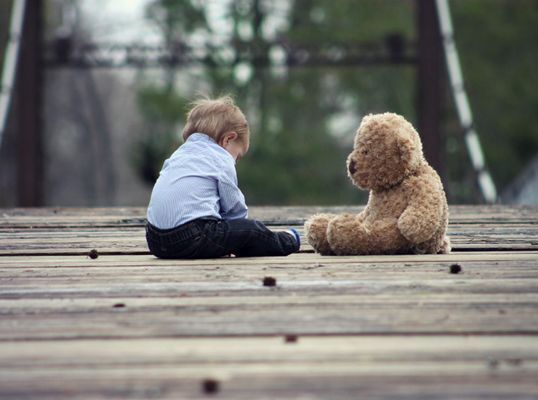
The loss of a baby impacts the entire family. Older brothers and sisters can be affected deeply by the death of the baby. Remember, if children are old enough to love, they are old enough to grieve. Children grieve differently than adults. Grief reactions exhibited by children will vary depending on their ages, development, and past experiences. It is important for children to know that they are loved and safe.
When talking with children about death, it is important to use clear, concrete language. Using statements such as “The baby went away,” or “The baby is sleeping in peace” can cause confusion and misconceptions for young children. Children’s questions should be answered honestly and appropriately, it is important to explain that SIDS and SUID occurs only in little babies and not in older children or adults.
Toddlers
For children 2 and under death is a foreign concept but toddlers will pick up on the absence of the baby. Oftentimes, toddlers grieve by becoming clingy or having tantrums. Toddlers can be supported by being given extra love and attention. If needed ask a family member or friend to help you give extra time to your toddler. Try to stick to your routine and maintain previously established rules and boundaries.
Preschoolers
Children between the ages of 3 and 5 may not understand that death is forever and at times may feel responsible for the death. They may think things such as "Did I cause the baby to die? Will I die too? Will Mommy and Daddy die? Am I still a big sister or brother? Who will take care of me now?" Preschoolers may also grieve by regressing in behaviors or asking repetitive questions. You can support your preschooler by answering their questions and explaining things, proving opportunities for them to play, maintaining routine as much as possible, and assuring them of their safety.
School-age
For school-age children, death can be a scary concept. At this time, they can understand the permanency of death. Children ages 6 to 11 may grieve by asking for specific details related to the death, hiding their feelings, or demonstrating behavioral changes. Children in this age and stage can be supported by being given safe activities to express feelings, being included with the family, and having opportunities for normalcy such as time with friends.
Teens
Teens who are 12 and older can understand death more complexly and start making connections between death and spirituality. When teens are grieving, they may have mood swings or engage in risky behaviors. Oftentimes, teens may be concerned about being judged for being too emotional or not emotional enough. A good way to support your teen is to let them know that you are grieving too and offer opportunities for them to share their feelings with you, all the while providing space if needed. Teens may prefer to talk or confide in their friends, so you can let them know you are available but try not to push the topic. A journal is often a helpful tool for older children to express themselves.
The best way to help children grieve is to show them. Family members should be open in expressing their thoughts and feelings. This openness will enable children to also express how they feel and to ask questions about the death. Lines of communication about the death should be kept open for years since children's questions and ability to understand change as they develop and their concept of understanding of death develops. They will need more complete information over time as this development occurs.
Let's Talk About Our Baby: A Book for Families After A Sudden Infant Death
The Iowa SIDS Foundation collaborated with Words Worth Repeating to create a specialized book for families that have had a baby die suddenly and for any reason. The words and illustrations are appropriate for a variety of family dynamics, races, and cultures. The goal of this book is to give caregivers the words to talk about this hard subject with children affected by a baby's death. You can purchase the book on Amazon. Part of the proceeds are given directly to the Iowa SIDS Foundation to help fund the support provided to families following the death of a baby.

